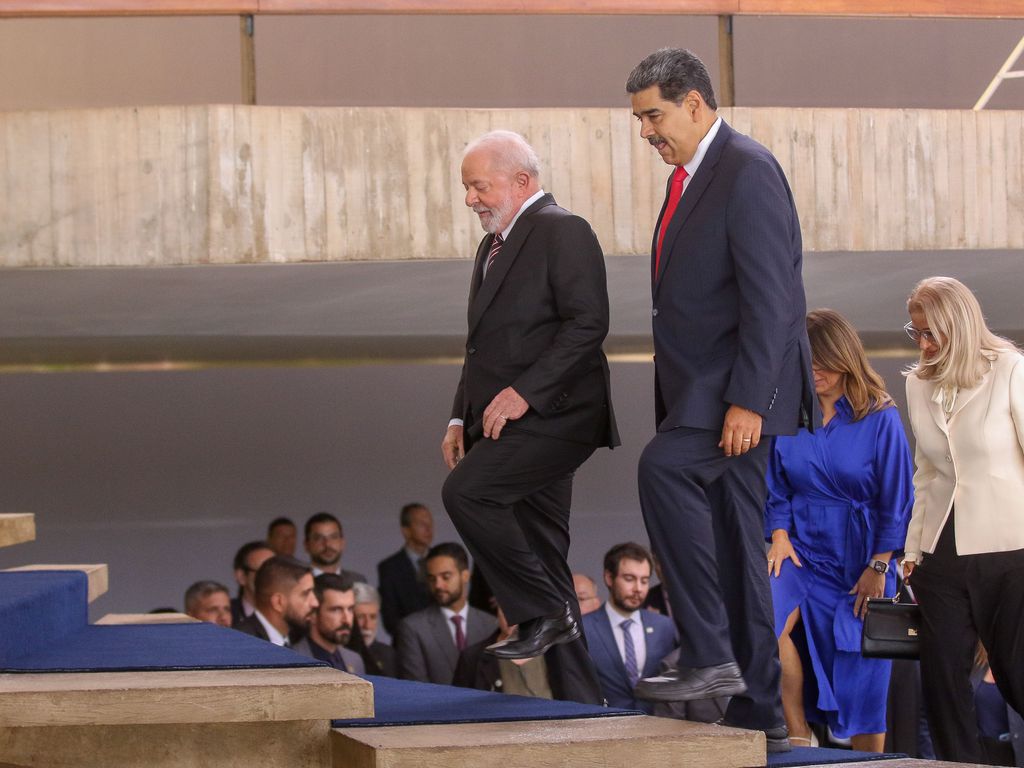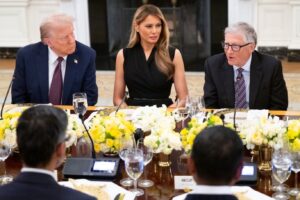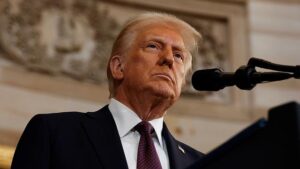
Published 29/05/2023 19:32 | Edited 5/30/2023 5:23 PM
Before the rupture of diplomatic relations between the government of Jair Bolsonaro and the government of Nicolás Maduro, trade between Brazil and Venezuela reached the level of US$ 6 billion in 2023, falling to US$ 1.7 billion in 2022. The rupture did not occur for practical reasons, but ideological ones, since Bolsonaro wanted to align himself with the hostility that US President Donald Trump had with the South American country.
“This is bad for Venezuela and it’s bad for Brazil, because extraordinary trade is the one that works both ways,” said President Luis Inácio Lula da Silva.
This drop in the trade balance with the neighboring country was a memory that Lula made a point of mentioning in the historic meeting that took place this Monday (29), at the Planalto Palace, with Venezuelan President Nicolás Maduro. Now, there are negotiations to resume this commercial exchange.
The meeting marks the resumption of relations between the two countries. On Tuesday (30), Maduro participates, alongside 11 other South American heads of state, in a meeting with the Brazilian president.
During his speech, Lula recalled that “Venezuela has always been an exceptional partner for Brazil. But, due to political contingencies and mistakes, President Maduro did not come to Brazil for eight years.”
Maduro has not visited Brazil since 2015, when Dilma Rousseff took office for the second term.
“It is a pleasure to welcome you here again. It is difficult to conceive that so many years have passed without them maintaining dialogues with the authority of a neighboring Amazonian country, with which we share an extensive border of 2,200 km”, declared Lula.
Venezuela’s suspension from Mercosur, and the country’s distancing from Brazil, generated negative impacts on the Brazilian trade balance, with losses in export flows, which were driven by basic products such as sugar, butter and cereals.
Before the crisis, the state of São Paulo exported 70% of all Brazilian products to Venezuela. However, after several maritime embargoes carried out due to political problems, economic transactions are carried out by land, across the border of Roraima and Amazonas.
After the onset of the crisis, Brazilian influence was mainly maintained along the border between the two countries, especially in the state of Roraima. Both formal exports to Venezuela and small border trade have grown significantly over the past three years.
Brazilian business community
Lula also mentioned the problem that the diplomatic rupture creates for businessmen on both sides, generating insecurity for everyone. The rupture also caused Venezuela to stop paying its debts to the Brazilian government.
Despite this, the country established a wartime economy for its recovery. Last year there was a surprising growth of 15% and this year there are forecasts by the IMF and various organizations that Venezuela will grow by 5%.
“We know the difficulties we have, the number of companies that are already in Venezuela and want to return to Venezuela. We know about Venezuela’s debt, and we know that all of this is part of, and will be part of, an agreement that we make so that our integration is complete”, he declared.
The Venezuelan president said that the neighboring country has “open doors” and “with full guarantees” for the Brazilian business community. Venezuela has been facing an economic crisis for more than a decade, motivated by fluctuations in the international price of oil and aggravated by ideological disputes with the United States, which has imposed 900 economic sanctions against the country.
“We are ready to resume virtuous relations with Brazilian businessmen. Venezuela’s doors are open, with full guarantees for the entire business community so that we can return to working together. I think it’s very positive. We love the history of the Brazilian people, strength and spiritual joy. May no one ever close the door again. Brazil and Venezuela have to be united, from now on and forever”, said Maduro.
nods of partnerships
The Brazilian president also said that the summit of South American presidents, to be held this Tuesday (30th) in Brasília, should discuss the deepening of the integration of the continent, following the example of what happens in the European Union and the African Union.
Lula also said he was personally in favor of Venezuela joining the Brics (a group with Brazil, Russia, India, China and South Africa) and could take the issue to the group, if formally requested.
In his speech, Maduro reinforced the discourse of regional integration, defended the construction of what he called a new South America and theorized about Venezuela’s entry into the BRICS bloc. “Along with the Brics, we see, in the geopolitical scope, elements that can make us move forward. The union of five very powerful countries”.
Maduro, in turn, classified the Brics as an “advanced element” in the construction of what he called a “new, multipolar world” and highlighted, mainly, the possibilities of financial articulations within the bloc.
“The Brics have become a great magnet for all countries that want a world of peace, more than 30 countries want to join the Brics. Now, at Banco dos Brics there is a great Brazilian, President Dilma Rousseff. […] If they ask us, we say yes, we want to be part of the Brics, in a modest way, to accompany the construction of the architecture of this new world that is being born”, he said.
Lula and Maduro signed memorandums of understanding in the agricultural area, in addition to a supervisory mechanism for bilateral cooperation.
Lula said that Brazil wants to resume “energy integration” with Venezuela. According to him, negotiations will be resumed so that Venezuela can supply electricity to Roraima, the only state in Brazil that is not part of the National Interconnected System (SIN) and depends on the generation of thermoelectric energy (more expensive and more polluting). . The plan includes the reactivation of the Guri Line to guarantee the electricity supply in the northern state.
“We have 120 Mega Watts available, we are ready and we need a basic investment of US$ 4 or US$ 5 million to rebuild the transmission lines. If we get that investment, we would be very ready to reconnect [a hidrelétrica de] Guri to Roraima, we expect cooperation and investment from Brazilian businessmen”, said the President of Venezuela.
President Lula defended that the countries of South America recover the region’s defense council, dedicated to cooperation for border security.
“I think you have to go back. To combat organized crime, drug trafficking and to prepare border defense, it is necessary to have cohesive Armed Forces, working together and preparing to guarantee the sovereignty of countries, ”he said.
According to Lula, the device was successful and built unanimously within the scope of the Union of South American Nations (UNASUR).
For Maduro, defense cooperation between the countries should never have ended. According to him, bilaterally, Brazil and Venezuela are in talks to establish a new protocol to defend and combat border crimes. “We have four years of lack of communication on issues such as security and defense and this has worsened the situation at the borders,” he said at a press conference alongside Lula.
dream of integration
Lula said he was aware of the “difficulties” in Venezuela’s relationship with Brazil and the rest of the world – he cited the foreign debt and the fight against drug trafficking as examples – but said that the government would seek “full integration” between the two countries. And he also spoke of the importance of integrating the entire continent, a debate that he will hold tomorrow with the leaders of neighboring countries.
“If we are together, we have 450 million people, we have a GDP of almost US$ 4.5 trillion. We have strength in the negotiation process and that is why this moment [cúpula] It’s important,” he added.
Lula always highlights the importance of the continent’s countries being integrated to impose themselves as an economic bloc in the world.
“This moment is important for many reasons, but one of them is because South America has to convince itself that we have to work as if it were a bloc. Nobody can imagine that, alone, a country in South America will solve its problems that last more than 500 years”, added Lula.
Lula also said that he “dreams” that the Brics could create their own currency, in order to circumvent the hegemony of the dollar in international trade. Countries’ distrust of the US currency has increased after the series of sanctions imposed against Russia in response to the war in Ukraine.
“For example, Maduro doesn’t have dollars to pay for his exports, who knows he might start paying in yuan. Who knows, maybe we can get paid in another currency”, said Lula. “It’s his fault? No. It’s the fault of the United States, which made an extremely exaggerated blockade. I always think the blockade is worse than a war. In war, the soldier who is in battle dies, in the blockade, children, women, people who have nothing to do with the ideological dispute are killed,” she added.
“Only one country has a dollar-making machine and that country does whatever it wants with the dollar. It is not possible that we do not have more freedom. I dream that the Brics can have a currency, like the Euro in the European Union,” she said.
Source: vermelho.org.br

